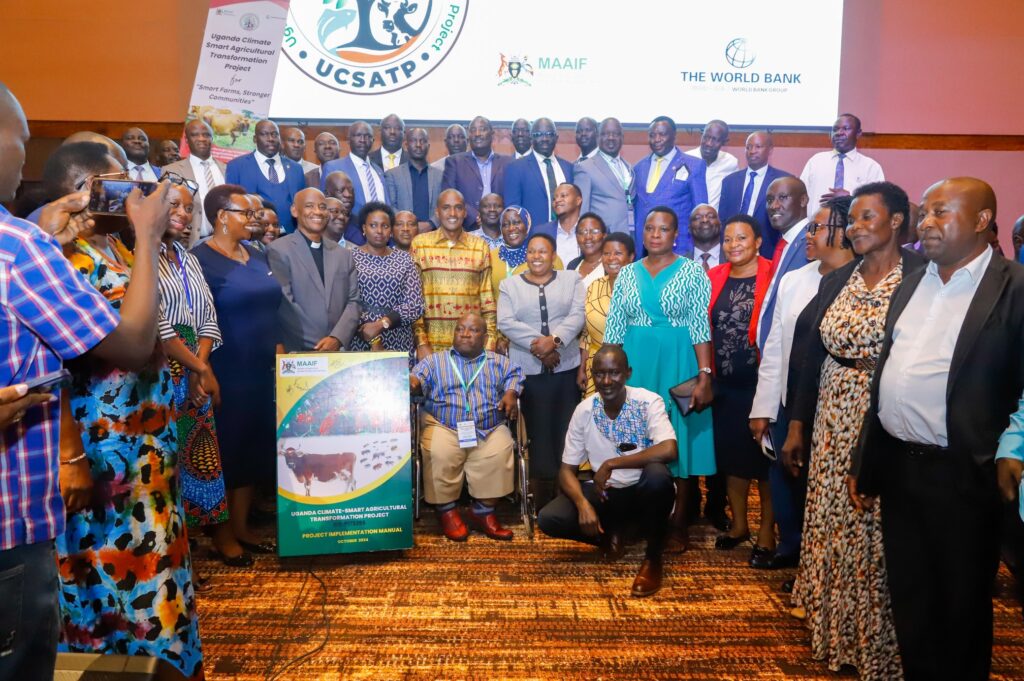The Ministry of Agriculture, Animal Industry and Fisheries (MAAIF) has embarked on the implementation phase of the new six-year World Bank-funded Uganda Climate Smart Agriculture Transformation Project (UCSATP), worth USD $354 million. The project runs from 2022 to 2028.
The development objective of the Climate Smart Agricultural (CSA) Transformation Project for Uganda is to increase productivity, market access, and resilience of select value chains in the project area and to respond promptly and effectively to an eligible crisis or emergency.
The UCSATP aims to scale up climate-smart technologies and management practices in selected agricultural value chains to enhance productivity and resilience. It seeks to address existing gaps in incentive mechanisms that hinder the uptake and scaling up of these technologies.
The development was highlighted on Friday during the conclusion of a three-day agricultural sector stakeholders’ engagement workshop held at the Sheraton Hotel. The event, organized by MAAIF in collaboration with World Bank officials, aimed to sensitize stakeholders on the project’s rollout principles.
Alex Asiimwe, Deputy Project Coordinator (DPC) of UCSATP, told participants that the project targets over 700,000 households across 13 regions, including 69 selected districts and 7 refugee-hosting districts. The project will support access to technologies developed through research and facilitate market access. These efforts are expected not only to enhance income generation but also support the sustainability of scaling up climate-smart agriculture (CSA) technologies, along with ICT-enabled interventions for system and institutional strengthening.
The project is designed to support the Government of Uganda in identifying, developing, and incentivizing the adoption of CSA technologies and management practices. These practices aim to promote climate adaptation in agricultural value chains, sustainably increase productivity and household incomes, and enhance resilience to climate shocks.
Dr. John Ilukor, an economist at the World Bank’s Uganda country office, cautioned project stakeholders particularly suppliers of goods and services to ensure value for money in all the services they provide to farmer groups. He emphasized the importance of avoiding low-quality products, which could negatively impact the project’s success.
He further explained that the project comprises five interlinked components: strengthening smart agricultural research, seed and agro-climatic information systems; promoting adoption of CSA technologies and practices; market development and linkages for selected value chains; a contingency emergency response component; and project management, coordination, and implementation.
Eng. Francis Waneloba revealed that the project includes a grant-matching mechanism where the government will contribute 80% of the input costs, while farmers will contribute 20%. This is expected to support the effective implementation of the project and includes the procurement of 1,500 walking tractors and 1,500 tractors, along with project-specific tools and implements.
The government has appointed M-Cash Uganda Ltd as the official funds disbursement agency. According to Joseph Ssekono, M-Cash’s Head of IT and Enterprise Solutions, the company will manage all in-house financial transactions among identified stakeholders using their e-voucher funds transfer system.
The MAAIF (Ministry of Agriculture, Animal Industry and Fisheries) held a Smart Agriculture workshop at Sheraton Hotel Kampala from July 22nd to 25th, 2025. The workshop focused on engaging private sector actors in crop value chains. It was part of the uganda cLIMATE Smart Agric Transformation Project (UCSATP)

